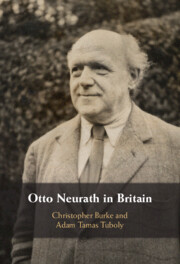Book contents
- Otto Neurath in Britain
- Otto Neurath in Britain
- Copyright page
- Contents
- Figures
- Acknowledgements
- Archival Sources and Abbreviations
- Introduction
- Chapter 1 Prelude
- Chapter 2 From Vienna to The Hague
- Chapter 3 Escape and Internment
- Chapter 4 Becoming ‘British Furniture’
- Chapter 5 Logical Empiricism in Britain
- Chapter 6 The Language Problem
- Chapter 7 Visual Education
- Chapter 8 On German Culture and Post-war Re-education
- Chapter 9 From Socialist to Democratic Planning in Context
- Chapter 10 ‘Sociologist of Happiness’
- Coda
- Bibliography
- Index
Chapter 7 - Visual Education
Published online by Cambridge University Press: 09 January 2025
- Otto Neurath in Britain
- Otto Neurath in Britain
- Copyright page
- Contents
- Figures
- Acknowledgements
- Archival Sources and Abbreviations
- Introduction
- Chapter 1 Prelude
- Chapter 2 From Vienna to The Hague
- Chapter 3 Escape and Internment
- Chapter 4 Becoming ‘British Furniture’
- Chapter 5 Logical Empiricism in Britain
- Chapter 6 The Language Problem
- Chapter 7 Visual Education
- Chapter 8 On German Culture and Post-war Re-education
- Chapter 9 From Socialist to Democratic Planning in Context
- Chapter 10 ‘Sociologist of Happiness’
- Coda
- Bibliography
- Index
Summary
Neurath’s interest in international languages led to him developing an alternative to verbal language, the pictorial technique of Isotype. This chapter documents significant wartime projects using this method, including animated sections for documentary films and charts for publications produced by pioneering ‘book packager’ Adprint. The Isotype Institute contributed to the book on Lancelot Hogben’s own invented language Interglossa. Neurath also explored the establishment of a research centre for visual education in consultation with Hogben, Julian Huxley, and US ambassador J. G. Winant. His last book project titled ‘Visual Education’ was written for Karl Mannheim’s ‘International Library of Sociology and Social Reconstruction’, although it remained unpublished until long after his death. It was a wide-ranging reflection on the acquisition of knowledge and its social determinacy.
Keywords
- Type
- Chapter
- Information
- Otto Neurath in Britain , pp. 179 - 207Publisher: Cambridge University PressPrint publication year: 2025

